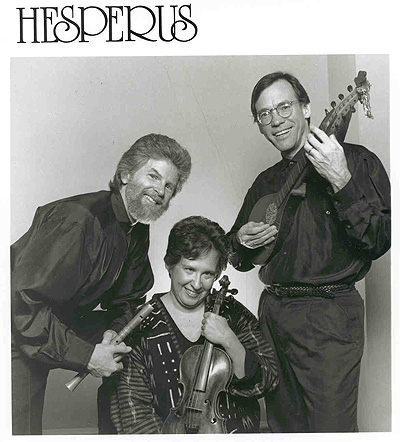Hesperus and Colonial American music

Hesperus was founded as a baroque ensemble in Arlington, Va., in 1979, but quickly expanded its repertoire to include colonial American music. The D.C. area, including Virginia and Maryland, is a marvelous place to research and perform music from seventeenth- and eighteenth-century America; there are many restored historical sites, most of which regularly present concerts and festivals. The Library of Congress has one of the best collections of colonial and Federal American music in the country, and Colonial Williamsburg and Monticello both provide many additional resources.
The earliest colonists brought the music of their homelands with them; American music before the mid-eighteenth century represents the diversity of our nation of immigrants. As the colonies began to see themselves as independent from Great Britain politically and economically, they began to develop a cultural independence as well. The creative energy that carved out a new nation also fueled its lively, idiosyncratic musical style. That energy wasn’t reflected in its pleasant but undistinguished parlor/classical music, but rather in other genres: dance music, broadside ballads and ballad operas, dissonant, modal devotional hymns, marches, and play-party songs.
Our concerts feature a mixture of classical and popular musics, with a good representation of Scots-Irish ballads, dances, variation sets, and airs. We frequently program such British composers/collectors as John Playford (The English Country Dancing Master), Benjamin Carr (The Division Flute), and Thomas Ravenscroft (Deuteromelia, Pammelia); Scots-Irish composers/collectors Burke Thumoth, Turloch O’Carolan, and James Oswald, as well as tunes from such lute manuscripts as the Rowallan and the Dixon. We also program vocal music by composers of the First New England School: William Billings, Daniel Read and Supply Belcher, whose music became the cornerstone of our current Sacred Harp repertoire. One of our biggest sources for dance music is the Library of Congress’s collection of Cotillion books. Printed between 1780 and 1850, they drew from an intriguing mixture of French round-o’s and rigaudons, Irish jigs, Scottish reels, English country dances, opera arias, and a smattering of other European popular tunes. The broadside ballad was vastly popular: taking a familiar tune as a model, scribblers would pen a lyric about some happening of the day—such as a battle, a murder or hanging—and print it on a wide sheet of paper known as a broadside. Since it was “sung to the tune of,” people didn’t have to read music. Particularly during the ups and downs of war or an especially vituperative presidential election, the broadside ballads expressed current popular sentiment as up-to-date as any blog.
Our approach to this eclectic repertoire can be summarized as informed and participatory. In our opinion, very little written music was meant to be played as written (even there, the eighteenth-century printer’s typical slipshod proofreading can obscure a composer’s original intentions). Much written popular music was meant as a memory aid, a foundation for improvisation and arrangements. Rather than reading the music and playing it as written in the classical style, we learn from current, continuous living traditions, extrapolating from modern-day traditional rural fiddle players like Tommy Jarrell and Clyde Davenport; ballad singers such as Jean Ritchie and Molly Andrews; Irish fiddlers like Kevin Burke and Brendan Mulvihill, and Scottish fiddlers Bonnie Rideout and Elke Baker. In order to best reflect the different styles of music, we’ve studied with many of these performers, as well as inviting many of them to perform with us.
Visit Hesperus’s website.
Sound files:
“Bobbing Joe Medley: Bobbing Joe,” Tina Chancey, violin, Mark Cudek, recorder, Scott Reiss, hammered dulcimer. Track from Early American Roots (1997). Courtesy of Chancey/Hesperus.
“Federal Overture,” by Benjamin Carr. Scott Reiss, recorder, Tina Chancey, fiddle, Grant Harried, lute, guitar. Track from Colonial America: spirited sounds from across the sea to the shores of the new land (2003). Courtesy of Chancey/Hesperus.
This article originally appeared in issue 13.2 (Winter, 2013).

